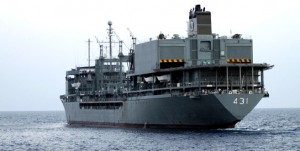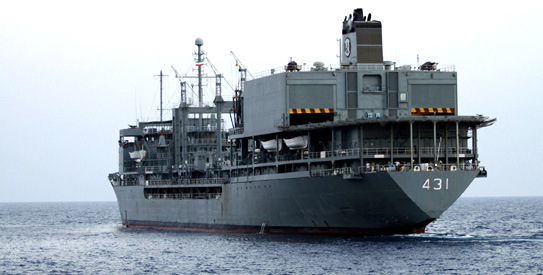By: Mohammad Alatrooch

(AFP Photo)
Chairman of New Marine Shipping and member of the Shipping Chamber of Alexandria Abdel-Rahman Al-Awa, revealed that New Marine is currently seeking to start an integrated project for the unloading and storage of grains at river ports, with an initial investment of up to $150m directed through the Middle East River Transportation Company (MERT), said Al-Awa in an interview with Logistic.
Al-Awa, the brother of former presidential candidate and Islamic thinker Mohamed Selim Al-Awa, recently announced the conclusion of an agreement between Kuwait’s Kharafi Group and New Marine subsidiary Alfa Trans for River Transport, in order to establish the new company, MERT, as a joint venture with 10 shareholders, notably Kuwaiti businessman Marzouk Nasser Al-Kharafi, chairman of the Kharafi Group and president of the new company, and Khaled Al-Awa, who will act as managing director, in addition to eight other shareholders.
“The new company oversaw the completion of the licences required to implement the grain handling and storage project,” he said. “It is expected to begin its implementation by the end of the first quarter of this year”.
He added that the investment plan for MERT was put forward according to a study that will be implemented over the next seven years, and which will be based on the establishment of a number of areas for grain storage, as it began to invest in a storage area at Mahmoudiya Lake in Alexandria on an area of 40,000 square meters.
He added: “The project will comprise the unloading of grains from river ports using the latest methods. The storage process takes place automatically, and immediately after the unloading of the grain, which is stored and then transported efficiently to the importer, saving time, effort and energy, in addition to bypassing land transport charges.”
Al-Awa explained that the seven-year joint plan between New Marine and the Kharafi Group includes investment in the establishment of a number of anchors on the banks of the Nile to form an entire cycle of grain and goods transportation throughout the river, starting with cargo passing through the unloading and subsequent storage phases, whereupon the grain will be grinded near to the river ports in order to reach the importer in the proper condition.
“MERT plans to create five ports along the Nile River through a study prepared by the group in the long term,” he confirmed.
The company works in the service sector as a navigational agent for ships, as it doesn’t have regular lines of its own, and offers services to vessels transiting through the Suez Canal, from entry to exit.
Al-Awa said that marine services activities had been heavily influenced by the events that have taken place in Egypt since the revolution, and that New Marine, which used to serve around 500 ships per year, now only serves around 150.
He added that the private sector finds it difficult to deal with state sector employees in administrative positions, especially in the field of marine services where some of the workers tend to disrupt work, with their main goal being to collect money “unjustly” for routine services.
Al-Awa confirmed that transport and logistics infrastructure in Egypt is still far from international standards due to poor state resources, corruption and limited land.
He also called for the reconsideration of the planning of transport and logistics infrastructure in order to conform with international standards, and to find alternatives for the transport of goods by land by encouraging the private sector to invest in river transport.
Al-Awa mentioned that river transport is one of the vital alternatives to land transport as it can account for nearly 40% of the volume of goods transported by road; however, it needs navigational measures and future studies to invest in it in addition to investing strongly in the logistics sector.
He also called on the government to seriously consider establishing additional sea and river ports in order to serve foreign and domestic trade, thus maximising the use of Egypt’s waterways, which are currently “monopolised” by the Suez Canal .
He said the state can encourage the private sector to invest in transport by establishing a holding company for transport that will be divided into shares, and which could enter the Egyptian private sector as an active partner.
He stressed that the maritime transport sector boasts many investment opportunities which will create many shipyards specialised in the construction and repair of ships. He called for allowing the private sector to enter into shipbuilding projects and to encourage it to invest in ports and shipyards.
Al-Awa urged the Egyptian government to study the Turkish and Greek experiences in building repair and shipbuilding yards, and the transfer of expertise, knowledge and international technology in this area, as well as taking advantage of the human resources that Egypt enjoys.
He noted that the private sector has a desire to invest in ports and shipyards but it is prohibited from investing in this sector indirectly due to the presence of obstacles; the difficulty of entry of spare parts and equipment used in the repair or construction of ships and the bureaucracy, according to him, prevent businessmen from investing in repairing and building ships and ports.




